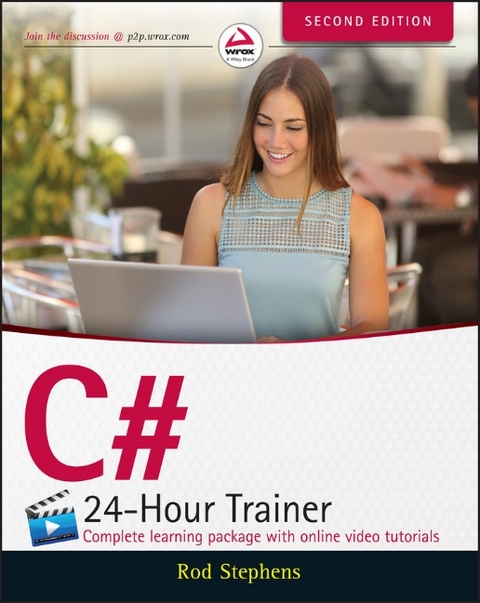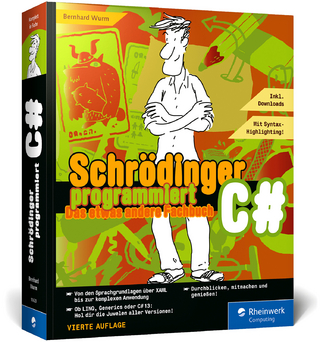
C# 24-Hour Trainer
John Wiley & Sons (Verlag)
978-1-119-06566-1 (ISBN)
- Titel ist leider vergriffen;
keine Neuauflage - Artikel merken
C# 24-Hour Trainer, 2nd Edition is your quick and easy guide to programming in C#, even if you have no programming experience at all. Updated to align with the latest C# standard, this book is your comprehensive beginner's guide, with each lesson supplemented by a video, for over ten hours of video training. Each chapter focuses on a specific concept or technique, with detailed, easy-to-follow explanation followed by a hands-on exercise. The goals of each exercise are outlined in advance to help you understand what you're working toward, and step-by-step instructions walk you through the operation from start to finish. Complex areas are clarified with specifically highlighted pointers that head off confusion, and additional exercises are provided so you can practice your new skills. Full instructor ancillaries are included to make this guide classroom ready, and the author's own website offers ongoing support.
C# has become one of the most popular programming languages in the world, with millions of lines of code used in businesses and applications of all types and sizes. This book helps you dive right in so you can start programming right away.
Start right in with the latest C# standard
Learn at your own pace, with hands-on practice
Clear up confusion and work around common obstacles
Build your own Windows, .NET, and mobile applications
C# has become a increasingly popular and in-demand programming skillsets. If you've decided to learn C#, this 24-Hour Trainer is your ultimate guide.
Rod Stephens is a programming guru, C# specialist, and the author of 30 programming books covering C#, Java, VB, and more. His C# Helper website (www.csharphelper.com) is a trusted resource in the programming community, receiving tens of thousands of monthly hits for the helpful tips, tricks, and code for professional C# programmers. Rod has applied his expertise in diverse fields, from communications to professional sports training.
INTRODUCTION xxvii
PART I: THE VISUAL STUDIO IDE AND CONTROLS
LESSON 1: GETTING STARTED WITH THE VISUAL STUDIO IDE 3
Installing C# 4
Configuring the IDE 6
Building Your First Program 7
Copying Projects 12
Exploring the IDE 13
Try It 16
Lesson Requirements 17
Hints 17
Step-by-Step 17
Exercises 20
LESSON 2: CREATING CONTROLS 21
Understanding Controls 21
Properties 22
Methods 22
Events 22
Creating Controls 23
Setting Control Properties 24
Control Names 26
Popular Properties 27
Modifying Properties in Code 28
Arranging Controls 30
Snap Lines 30
Arrow Keys 31
The Format Menu and Layout Toolbar 31
WPF Controls 32
Try It 32
Lesson Requirements 33
Hints 33
Step-by-Step 33
Exercises 37
LESSON 3: MAKING CONTROLS ARRANGE THEMSELVES 43
Restricting Form Size 44
Using Anchor Properties 44
Using Dock Properties 47
Layout Containers 48
Windows Forms Controls 48
WPF Controls 49
Try It 50
Lesson Requirements 51
Hints 51
Step-by-Step 52
Exercises 52
LESSON 4: HANDLING EVENTS 57
Making Event Handlers 57
Using Event Parameters 59
Setting Scrollbar Properties 60
Tracking Mouse Movement 61
Moving the Mouse Picture 61
Removing Event Handlers 62
Adding and Removing Event Handlers in Code 62
Useful Events 63
Try It 65
Lesson Requirements 65
Hints 65
Step-by-Step 66
Exercises 66
LESSON 5: MAKING MENUS 73
Creating Menus 73
Setting Menu Properties 75
Handling Menu Events 76
Creating Context Menus 77
WPF Menus 78
WPF Context Menus 79
WPF Commanding 79
Try It 80
Lesson Requirements 80
Hints 81
Step-by-Step 81
Exercises 83
LESSON 6: MAKING TOOL STRIPS AND STATUS STRIPS 89
Using Tool Strips 89
Using Tool Strip Containers 91
Using Status Strips 92
Try It 93
Lesson Requirements 93
Hints 95
Step-by-Step 95
Exercises 98
LESSON 7: USING RICHTEXTBOXES 103
Using RichTextBox Properties 103
Giving the User Control 105
Using RichTextBox Methods 106
Using WPF Commands 108
Try It 110
Lesson Requirements 110
Hints 110
Step-by-Step 110
Exercises 112
LESSON 8: USING STANDARD DIALOGS 115
Using Dialogs in General 116
Adding the Dialog to the Form 117
Initializing the Dialog 117
Displaying the Dialog and Checking the Return Result 118
Processing the Results 119
Putting It All Together 120
Using Dialog Properties 120
Using File Filters 123
Using Dialogs in WPF 124
Try It 126
Lesson Requirements 126
Hints 127
Step-by-Step 127
Exercises 130
LESSON 9: CREATING AND DISPLAYING NEW FORMS 133
Adding New Forms 133
Understanding Classes and Instances 134
Displaying Forms 135
Controlling Remote Forms 138
Try It 140
Lesson Requirements 141
Hints 141
Step-by-Step 141
Exercises 143
LESSON 10: BUILDING CUSTOM DIALOGS 147
Making Custom Dialogs 147
Setting the Dialog Result 148
Using Custom Dialogs 149
Try It 150
Lesson Requirements 150
Hints 151
Step-by-Step 151
Exercises 153
PART II: VARIABLES AND CALCULATIONS
LESSON 11: USING VARIABLES AND PERFORMING CALCULATIONS 161
What Are Variables? 161
Data Types 161
Float, Double, and Decimal Data Types 163
Declaring Variables 164
Literal Values 165
Type Conversions 167
Casting 168
Converting 169
Parsing 169
Performing Calculations 170
Operands and Operators 171
Promotion 171
Operator Summary 171
Precedence 177
Constants 179
Try It 179
Lesson Requirements 180
Hints 180
Step-by-Step 181
Exercises 182
LESSON 12: DEBUGGING CODE 187
Deferred Techniques 187
Debugging Then and Now 188
Setting Breakpoints 188
Reading Variables 189
Stepping through Code 190
Using Watches 191
Using the Immediate Window 192
Try It 193
Lesson Requirements 193
Step-by-Step 194
Exercises 196
LESSON 13: UNDERSTANDING SCOPE 199
Scope within a Class 199
Same Named Variables 200
Method Variable Lifetime 201
Block Scope 202
Accessibility 203
Restricting Scope and Accessibility 204
Try It 204
Lesson Requirements 205
Hints 205
Step-by-Step 205
Exercises 208
LESSON 14: WORKING WITH STRINGS 211
String Methods 211
Format and ToString 213
Standard Numeric Formats 215
Custom Numeric Formats 217
Standard Date and Time Formats 218
Custom Date and Time Formats 219
Try It 222
Lesson Requirements 222
Hints 222
Step-by-Step 222
Exercises 223
LESSON 15: WORKING WITH DATES AND TIMES 225
Creating DateTime Variables 225
Local and UTC Time 226
DateTime Properties and Methods 226
TimeSpans 228
Try It 229
Lesson Requirements 230
Hints 230
Step-by-Step 230
Exercises 231
LESSON 16: USING ARRAYS AND COLLECTIONS 233
Arrays 233
Creating Arrays 234
A Fibonacci Example 235
Multi-Dimensional Arrays 236
Array Properties and Methods 237
Collection Classes 238
Generic Classes 239
Lists 240
SortedLists 240
Dictionaries 242
Queues 242
Stacks 242
Try It 243
Lesson Requirements 243
Step-by-Step 244
Exercises 245
LESSON 17: USING ENUMERATIONS AND STRUCTURES 249
Enumerations 249
Structures 250
Structures versus Classes 251
Reference Types 251
Value Types 252
Other Differences 252
Where to Put Structures 254
Try It 254
Lesson Requirements 255
Step-by-Step 255
Exercises 257
PART III: PROGRAM STATEMENTS
LESSON 18: MAKING CHOICES 263
Decision Statements 263
if Statements 264
if-else Statements 265
Cascading if Statements 265
Nested if Statements 266
switch Statements 267
Try It 269
Lesson Requirements 269
Hints 269
Step-by-Step 269
Exercises 270
LESSON 19: REPEATING PROGRAM STEPS 275
for Loops 275
foreach Loops 277
while Loops 278
do Loops 279
break and continue 281
Try It 282
Lesson Requirements 282
Hints 282
Step-by-Step 283
Exercises 284
LESSON 20: REUSING CODE WITH METHODS 289
Method Advantages 290
Method Syntax 291
Using ref Parameters 294
Using out Parameters 295
Try It 296
Lesson Requirements 296
Hints 296
Step-by-Step 296
Exercises 298
LESSON 21: HANDLING ERRORS 301
Errors and Exceptions 301
try-catch Blocks 302
TryParse 304
Throwing Exceptions 305
Try It 307
Lesson Requirements 307
Hints 308
Step-by-Step 308
Exercises 309
LESSON 22: PREVENTING BUGS 313
Input Assertions 313
Other Assertions 316
Try It 316
Lesson Requirements 317
Hints 317
Step-by-Step 317
Exercises 319
PART IV: CLASSES
LESSON 23: DEFINING CLASSES 325
What Is a Class? 325
Class Benefi ts 326
Making a Class 327
Properties 327
Try It 330
Lesson Requirements 330
Step-by-Step 330
Methods 331
Events 332
Delegates 332
Event Handler Delegates 333
Try It 336
Lesson Requirements 336
Hints 337
Step-by-Step 337
Inheritance 339
Polymorphism 340
Try It 341
Lesson Requirements 341
Hints 341
Step-by-Step 342
Exercises 344
LESSON 24: INITIALIZING OBJECTS 347
Initializing Objects 347
Constructors 348
Parameterless Constructors 349
Parameterized Constructors 349
Destructors 350
Invoking Other Constructors 352
Try It 354
Lesson Requirements 354
Hints 355
Step-by-Step 355
Exercises 358
LESSON 25: FINE-TUNING CLASSES 361
Overloading Methods 361
Overriding Methods 362
Overriding ToString 363
Try It 365
Lesson Requirements 365
Hints 365
Step-by-Step 366
Exercises 367
LESSON 26: OVERLOADING OPERATORS 371
Overloadable Operators 371
Unary Operators 372
Binary Operators 373
Comparison Operators 374
Conversion Operators 374
Try It 375
Lesson Requirements 375
Hints 376
Step-by-Step 376
Exercises 379
LESSON 27: USING INTERFACES 383
Interface Advantages 383
Multiple Inheritance 383
Code Generalization 384
Implementing Interfaces 385
Defining Interfaces 388
Try It 389
Lesson Requirements 389
Hints 390
Step-by-Step 390
Exercises 392
LESSON 28: MAKING GENERIC CLASSES 397
Defining Generic Classes 397
Using Generic Constraints 399
Making Generic Methods 400
Try It 401
Lesson Requirements 401
Hints 402
Step-by-Step 402
Exercises 403
PART V: SYSTEM INTERACTIONS
LESSON 29: USING FILES 409
Filesystem Classes 409
DriveInfo 410
DirectoryInfo 410
Directory 412
FileInfo 412
File 413
Path 414
Streams 415
Writing Files 416
Reading Files 417
Try It 418
Lesson Requirements 418
Hints 418
Step-by-Step 418
Exercises 419
LESSON 30: PRINTING 421
Windows Forms Printing 421
Getting Started 422
Starting a Printout 422
Drawing Shapes 423
Drawing Text 424
WPF Printing 425
Printing Visuals 426
Try It 431
Lesson Requirements 431
Hints 431
Step-by-Step 432
Exercises 434
PART VI: WINDOWS APPS
LESSON 31: WINDOWS STORE APPS 439
Navigation Style 439
App Styles 440
App Images 440
Deployment 444
Deploying Locally 444
Deploying to the Windows Store 445
WPF Techniques 446
Using Styles 446
Setting Dependency Properties 447
Try It 448
Lesson Requirements 448
Hints 449
Step-by-Step 449
Exercises 452
LESSON 32: WINDOWS PHONE APPS 455
Building Apps 455
Navigation Style 458
App Styles 458
App Images 459
Try It 461
Lesson Requirements 461
Step-by-Step 462
Exercises 462
PART VII: SPECIALIZED TOPICS
LESSON 33: LOCALIZING PROGRAMS 467
Understanding Localization 468
Building Localized Interfaces 469
Testing Localizations 469
Processing Locale-Specific Values 470
Try It 472
Lesson Requirements 472
Hints 472
Step-by-Step 472
Exercises 474
LESSON 34: PROGRAMMING DATABASES, PART 1 479
Connecting to a Database 479
Displaying Data in a Grid 483
Displaying Data One Record at a Time 486
Try It 488
Lesson Requirements 488
Hints 488
Step-by-Step 488
Exercises 489
LESSON 35: PROGRAMMING DATABASES, PART 2 493
Searching 493
Filtering 494
Sorting 495
Try It 495
Lesson Requirements 495
Hints 496
Step-by-Step 496
Exercises 496
LESSON 36: LINQ TO OBJECTS 499
LINQ Basics 499
where Clauses 501
order by Clauses 504
select Clauses 504
Try It 507
Lesson Requirements 508
Hints 508
Step-by-Step 508
Exercises 509
LESSON 37: LINQ TO SQL 511
Connecting to the Database 511
Making LINQ to SQL Classes 515
Writing Code 517
Using LINQ Queries 518
Understanding Nullable Fields 519
Understanding Query Execution 520
Using LINQ to SQL with Access 522
Try It 524
Lesson Requirements 524
Hints 524
Step-by-Step 524
Exercises 525
AFTERWORD: WHAT’S NEXT? 527
INDEX 529
| Erscheint lt. Verlag | 18.12.2015 |
|---|---|
| Verlagsort | New York |
| Sprache | englisch |
| Maße | 189 x 233 mm |
| Gewicht | 1062 g |
| Einbandart | kartoniert |
| Themenwelt | Informatik ► Programmiersprachen / -werkzeuge ► C# |
| Informatik ► Software Entwicklung ► Objektorientierung | |
| Wirtschaft ► Betriebswirtschaft / Management ► Rechnungswesen / Bilanzen | |
| Wirtschaft ► Betriebswirtschaft / Management ► Unternehmensführung / Management | |
| Schlagworte | C sharp (Programmiersprache); Einführung |
| ISBN-10 | 1-119-06566-6 / 1119065666 |
| ISBN-13 | 978-1-119-06566-1 / 9781119065661 |
| Zustand | Neuware |
| Informationen gemäß Produktsicherheitsverordnung (GPSR) | |
| Haben Sie eine Frage zum Produkt? |
aus dem Bereich


